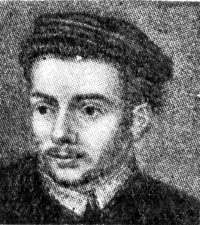
John Skelton
John Skelton (c. 1460 – June 21, 1529) was an English poet, variously asserted to have been born in Armathwaite, Cumberland, or Yorkshire. Many of his works included scathing indictments of the church or church figures, and although they were likely circulated in his day, they were not officially published until some time after his death.
Quotes
- Steadfast of thought,
Well made, well wrought,
Far may be sought,
Ere that ye can find
So courteous, so kind
As merry Margaret,
This midsummer flower,
Gentle as falcon
Or hawk of the tower.- To Mistress Margaret Hussey, lines 26-34, probably published c. 1511, reported in Bartlett's Familiar Quotations, 10th ed. (1919).
- There is nothynge that more dyspleaseth God,
Than from theyr children to spare the rod.- Magnificence, A goodly interlude, line 1954 (published c. 1533), reported in Bartlett's Familiar Quotations, 10th ed. (1919). Compare: He that spareth the rod hateth his son, Proverbs xiii. 24; They spare the rod and spoyl the child, Ralph Venning, Mysteries and Revelations (second ed.), p. 5. 1649; Spare the rod and spoil the child, Samuel Butler: Hudibras, pt. ii. c. i. l. 843.
- Gentle Paul, laie doune thy sweard
For Peter of Westminster hath shaven thy beard.- A couplet circulated in 1522 in criticism of Cardinal Wolsey's dissolution of convocation at St Paul's Cathedral, reported in Bartlett's Familiar Quotations, 10th ed. (1919).
- What dreamest thou, drunkard, drowsy pate?
Thy lust and liking is from thee gone;
Thou blinkard blowboll, thou wakest too late.- Lullay, Lullay, Like a Child (1527).
- He ruleth all the roste.
- Why Come ye not to Courte, another criticism of Cardinal Wolsey, line 198 (published c. 1550), reported in Bartlett's Familiar Quotations, 10th ed. (1919). Compare: "Rule the rost", John Heywood, Proverbs (1546) part i. chap. v.; "Her that ruled the rost", Thomas Heywood, History of Women; "Rules the roast", Ben Jonson, George Chapman, Marston: Eastward Ho, act ii. sc. 1.; William Shakespeare, 2 Henry VI. act i. sc. 1.
- Old proverbe says,
That byrd ys not honest
That fyleth hys owne nest.- Poems against Sir Christopher Garnesche, probably published c. 1523, reported in Bartlett's Familiar Quotations, 10th ed. (1919). Compare: "It is a foule byrd that fyleth his owne nest", John Heywood, Proverbs (1546) part ii. chap. v.
- I say, thou mad March hare,
I wonder how ye dare
Open your jangling jaws
To preach in any clause,
Like prating popping daws,
Against her excellence,
Against her reverence,
Against her pre-eminence,
Against her magnificence,
That never did offence.- Replication Against Certain Young Scholars (date unknown, but certainly after 1523, generally considered to be among Skelton's final works), a criticism of heretical thought among the young men then attending universities, reported in Bartlett's Familiar Quotations, 10th ed. (1919).
Jane Scroop (her lament for Philip Sparrow) (likely published c. 1509)
- PLA ce bo!
Who is there, who?
Di le xi!
Dame Margery,
Fa, re, my, my.
Wherefore and why, why?
For the soul of Philip Sparrow
That was late slain at Carrow,
Among the Nunnės Black.
For that sweet soulės sake,
And for all sparrows' souls,
Set in our bead-rolls,
Pater noster qui,
With an Ave Mari,
And with the corner of a Creed,
The more shall be your meed.
- Lines 1-16; the poem is about a girl who is distraught that her family's pet cat has killed her pet bird, a sparrow; the poem is the basis for the later nursery rhyme, Who Killed Cock Robin? The opening line, PLA ce bo, is from a canticle for the dead.
- When I remember again
How my Philip was slain,
Never half the pain
Was between you twain,
Pyramus and Thisbe,
As then befell to me.
I wept and I wailed,
The tearės down hailed,
But nothing it availed
To call Philip again
Whom Gib, our cat, hath slain.
- Lines 17-27.
- Maide, wydowe, or wyffe.
- Line 53.
- Like Andromach, Hector's wife,
Was weary of her life,
When she had lost her joy,
Noble Hector of Troy;
In like manner alsó
Increaseth my deadly woe,
For my sparrow is go.
- Lines 64-70.
Colyn Cloute (published c. 1550)
- For though my ryme be ragged,
Tattered and jagged,
Rudely rayne beaten,
Rusty and moughte eaten,
It hath in it some pyth.- Lines 53-58 (evaluating his own ability as a poet).
- In the spight of his teeth.
- Line 939. Compare: "In spite of my teeth", Thomas Middleton, A Trick to catch the Old One (1605), act i, scene 2.; Henry Fielding, Eurydice Hissed.
- He knew what is what.
- Line 1106. Compare: "He knew what ’s what", Samuel Butler, Hudibras, part i, canto i, line 149.
- By hoke ne by croke.
- Line 1240. Compare: "In hope her to attain by hook or crook", Edmund Spenser, Faerie Queene, book iii, canto i, stanza 17.
- The wolfe from the dore.
- Line 1531.
External links
This article is issued from
Wikiquote.
The text is licensed under Creative
Commons - Attribution - Sharealike.
Additional terms may apply for the media files.